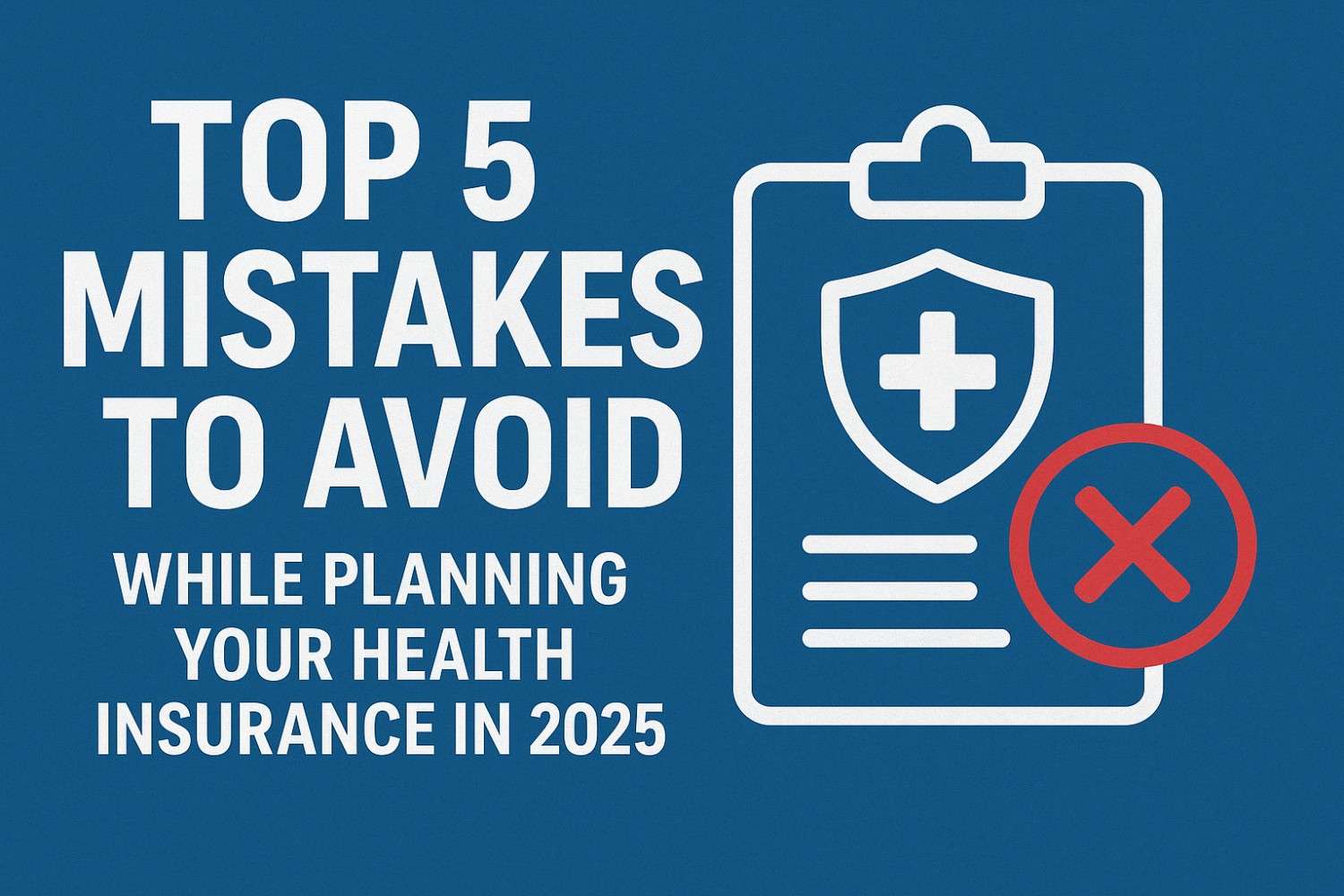Top 5 Mistakes to Avoid While Planning Your Health Insurance in 2025

Health coverage is no longer a luxury in India; it is a necessity shaped by rising treatment costs, longer life expectancy, and the growing prevalence of chronic conditions. As healthcare trends evolve in 2025, so too must your approach to health insurance planning. Even well-intentioned buyers can make avoidable errors that weaken their protection and strain their finances during critical moments.
The reality is that medical expenses can escalate quickly, and the wrong choice of policy can leave gaps that only become apparent in emergencies. This is why making informed decisions when buying a health insurance policy is crucial. Below, we explore the top five mistakes people often make and how you can avoid them to secure the right coverage.
Mistake 1: Underestimating the Required Sum Insured
Why it Happens
Many buyers select a sum insured that seems adequate today without considering inflation in healthcare costs. For example, a hospital procedure that costs ₹3 lakh today might exceed ₹6 lakh within a decade.
The Right Approach
When engaging in health insurance planning, calculate the sum insured based on your location, family size, and likely future needs. If you live in a metro city, aim for higher coverage due to higher treatment costs. Niva Bupa offers flexible sum insured options that can scale over time, ensuring you are not left under-covered.
Mistake 2: Ignoring Pre-Existing Disease Coverage and Waiting Periods
Why it Happens
Policyholders often focus on premium affordability and overlook waiting periods for pre-existing illnesses or certain procedures. This can result in claim rejections or delays when treatment is urgently needed.
The Right Approach
Read the policy document carefully to understand the waiting periods and coverage conditions. Plans that offer shorter waiting times or immediate cover for certain conditions are ideal if you have a medical history. This step ensures your health insurance policy is genuinely useful when it matters.
Mistake 3: Overlooking Comprehensive Benefits
Why it Happens
Some buyers equate health insurance solely with hospitalisation cover, ignoring other valuable benefits such as day-care treatments, preventive health check-ups, or coverage for alternative therapies.
The Right Approach
Modern health insurance planning goes beyond emergency care. Look for policies that include:
- Pre- and post-hospitalisation cover.
- Annual health check-ups.
- Cashless treatments at a wide network of hospitals.
- Coverage for day-care procedures.
- Add-ons like personal accident insurance for income protection in case of disability or accidental death.
With Niva Bupa, you can tailor your policy to include these features, ensuring a holistic safety net.
Mistake 4: Choosing Solely Based on Tax Benefits
Why it Happens
Section 80D of the Income Tax Act offers tax deductions for health insurance premiums, leading some buyers to choose the cheapest plan that qualifies for these deductions without evaluating actual coverage adequacy.
The Right Approach
While tax savings are a welcome bonus, they should never be the sole reason for selecting a plan. A low-cost policy with insufficient benefits could leave you paying more out-of-pocket during a health crisis. Always prioritise comprehensive protection over minimal premium outlay.
Mistake 5: Neglecting to Review and Update the Policy Regularly
Why it Happens
Life circumstances change—marriage, childbirth, ageing parents, or a new job can alter your healthcare needs. Yet, many policyholders continue with outdated coverage for years.
The Right Approach
Treat health insurance planning as an ongoing process. Review your policy every two to three years to adjust the sum insured, add riders, or upgrade benefits. For instance, adding personal accident insurance to your plan as your income grows ensures your family’s financial stability in case of unforeseen events.
The Role of Personal Accident Insurance in Health Planning
While a standard health cover safeguards against medical expenses, personal accident insurance serves as an income replacement tool. If an accident results in disability or loss of life, it provides a lump-sum benefit to the family. For breadwinners, this addition is crucial to ensure that household expenses, EMIs, and long-term commitments are not compromised.
How Niva Bupa Supports Smarter Health Insurance Planning
In 2025, consumers are increasingly seeking flexibility, transparency, and robust claims support in their insurance provider. Niva Bupa’s offerings align with these needs by:
- Providing lifetime renewability.
- Offering customisable add-ons to suit different life stages.
- Ensuring a smooth claim settlement process.
- Maintaining a broad hospital network for cashless care.
Such features help you avoid the pitfalls outlined above and create a future-ready coverage plan.
A Practical Example of Avoiding These Mistakes
Consider a 32-year-old professional living in Bengaluru with ageing parents. By avoiding the five mistakes, they might choose:
- A ₹25 lakh family floater plan with top-up options.
- Coverage for pre-existing conditions with minimal waiting period.
- Annual check-ups and day-care coverage included.
- A personal accident insurance rider for income protection.
- Regular reviews to adapt the plan to evolving needs.
This strategy ensures both immediate and long-term healthcare security.
Final Thoughts
The best health insurance planning is proactive, informed, and adaptable. Avoiding the five common mistakes outlined above ensures your health insurance policy delivers real value when you need it most. Integrating personal accident insurance into your plan adds an additional layer of protection, safeguarding not just against medical costs but also the financial impact of accidents.
In 2025, the key to strong healthcare protection lies in balancing comprehensive benefits with flexibility. With Niva Bupa, you can craft a plan that evolves alongside your life, offering dependable coverage year after year. Your health and your financial peace of mind deserve nothing less.



